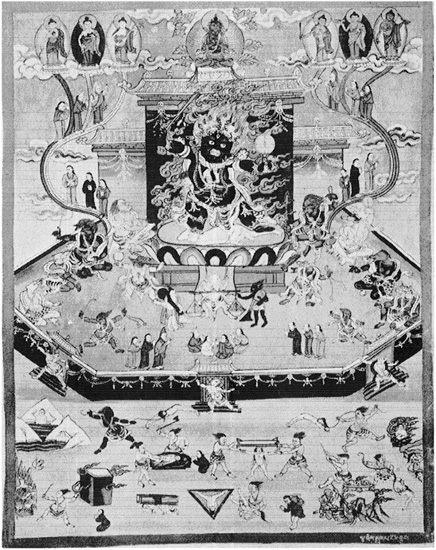
[Instructions to the Officiant]: Yet, again, it may be possible that because of the influence of bad karma one will not recognize even thus. Therefore, call the deceased by name, and speak as follows:
O nobly—born, (so—and—so), listen. That thou art sufferingso cometh from thine own karma ; it is not due to any oneelse’s: it is by thine own karma. Accordingly, pray earnestlyto the Precious Trinity; that will protect thee. If thouneither prayest nor knowest how to meditate upon the GreatSymbol nor upon any tutelary deity, the Good Genius,3 who
was born simultaneously with thee, will come now and count out thy good deeds [with] white pebbles, and the Evil Genius,1who was born simultaneously with thee, will come and count out thy evil deeds [with] black pebbles. Thereupon, thou wilt be greatly frightened, awed, and terrified, and wilt tremble; and thou wilt attempt to tell lies, saying, * I have not committed any evil deed’.
Then the Lord of Death will say, * I will consult the Mirror of Karma’.
So saying, he will look in the Mirror, wherein every good and evil act is vividly reflected. Lying will be of no avail.
Then [one of the Executive Furies of] the Lord of Death will place round thy neck a rope and drag thee along; he will cut off thy head, extract thy heart, pull out thy intestines, lick up thy brain, drink thy blood, eat thy flesh, and gnaw thy bones;2 but thou wilt be incapable of dying. Although thy body be hacked to pieces, it will revive again. The repeated hacking will cause intense pain and torture.
Even at the time that the pebbles are being counted out, be not frightened, nor terrified ; tell no lies; and fear not the Lord of Death.
Thy body being a mental body is incapable of dying even though beheaded and quartered. In reality, thy body is of the nature of voidness;8 thou needst not be afraid. The

THE JUDGEMENT Described on pages xxx—xxxiii, 35—8, 165—y, 240
THE MANTRA OF CHEN RAZEE

"OM MA—NI PAD—ME HUM”
Described on page xxxiv
Lords of Death1 are thine own hallucinations. Thy desire—body is a body of propensities, and void. Voidness cannot injure voidness; the qualityless cannot injure the qualityless.
Apart from one’s own hallucinations, in reality there are no such things existing outside oneself as Lord of Death, or god, or demon, or the Bull—headed Spirit of Death.2 Act so as to recognize this.
At this time, act so as to recognize that thou art in the Bardo. Meditate upon the Samadla of the Great Symbol. If thou dost not know how to meditate, then merely analyse with care the real nature of that which is frightening thee. In reality it is not formed into anything, but is a Voidness which is the Dharma—Kāya?
That Voidness is not of the nature of the voidness of nothingness, but a Voidness at the true nature of which thou feelest awed, and before which thine intellect shineth clearly and more lucidly: that is the [state of] mind of the Sambhoga—Kāya.
In that state wherein thou art existing, there is being experienced by thce, in an unbearable intensity, Voidness and Brightness inseparable,—the Voidness bright by nature and the Brightness by nature void, and the Brightness inseparable from the Voidness,—a state of the primordial [or unmodified] intellect, which is the Ådi—Kāya.A And the
power of this, shining unobstructedly, will radiate everywhere; it is the Nirmāna—Kāya.
O nobly—born, listen unto me undistractedly. By merelyrecognizing the Four Kāyas thou art certain to obtain perfectEmancipation in any of Them. Be not distracted. The lineof demarcation between Buddhas and sentient beings licthherein.1 This moment is one of great importance; if thoushouldst be distracted now, it will require innumerable aeonsof time for thee to come out2 of the Quagmire of Misery.
A saying, the truth of which is applicable, is:
‘In a moment of time, a marked differentiation is created; In a moment of time, Perfect Enlightenment is obtained.’
Till the moment which hath just passed, all this Bardo hath been dawning upon thee and yet thou hast not recognized, because of being distracted. On this account, thou hast experienced all the fear and terror. Shouldst thou become distracted now, the chords of divine compassion of the Compassionate Eyes will break,3 and thou wilt go into the place from which there is no [immediate] liberation. Therefore, be careful. Even though thou hast not recognized ere this—despite thus being set face to face—thou wilt recognize and obtain liberation here.
[Instructions to the Officiant]: If it be an illiterate boor who knoweth not how to meditate, then say this:
O nobly—born, if thou knowest not how thus to meditate, act so as to remember the Compassionate One, and the Sañgha, the Dharma, and the Buddha, and pray. Think of all these fears and terrifying apparitions as being thine own tutelary deity, or as the Compassionate One.4 Bring to thy recollection the mystic name that hath been given thee at the time
‘Even though thou fallest down precipices, thou wilt not be hurt Avoid awe and terror.